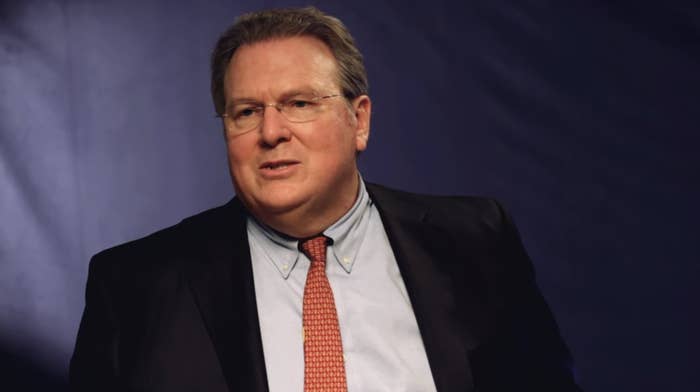
He spent a year moderating focus groups in six swing states, because he wanted a “complete education” in what “voters really want.” He worked with Penn Medicine to build his own financial model of the US health care system, because he wanted to map out a new plan to expand Medicare. And he retained a political consulting firm, cut checks to candidates in key primary states, and sought the advice of senators and governors and policy experts — because he might decide to run for president.
Meet: Richard Vague.
He is a 62-year-old businessman who lives in Philadelphia, made millions in banking and natural gas, has given thousands to Democrats (and Republicans), and now manages a venture capital company that invests in startups. He’s been in and around the policy world for years, namely through his work on the board of Penn Medicine and as the author of a book about economic crises, and after conducting research and focus groups over the past year, Vague believes he can draw on his decadeslong career as a CEO to present voters with “big, bold” government solutions to America’s “kitchen-table issues.”
“The history of the United States has been about doing bold things. The idea that the government oughta stay out of the way is not reflective of what’s actually happened in American history,” Vague said in an interview. “The government got involved in the transcontinental railway, the Erie Canal. The 12 components that constitute your iPhone all come directly or indirectly from government research: GPS, the internet, touchscreen.”
“This to me feels like another one of those moments. Government needs to step up. We’re America, damn it,” said Vague, who grew up in Texas and speaks with a slow Southern accent.
Vague, who sold his natural gas company, Energy Plus, for $190 million in 2011, may be the most unlikely, and unknown, name in a potential Democratic presidential field that already numbers double digits and includes everyone from the founder of Starbucks to new members of Congress and failed Senate candidates.
After Hillary Clinton’s loss to Donald Trump, Vague said, he felt he “didn’t know what voters really wanted.” Through former Pennsylvania governor Ed Rendell — a “good friend,” says Vague — he hired Cornerstone Government Affairs, a Washington lobbying and political consulting firm, to help him organize his own focus groups. In the span of about a year, he personally conducted 20 focus groups with middle-class voters, both Democratic and Republican, in six presidential battleground states: Nevada, Florida, Pennsylvania, Michigan, Iowa, and New Hampshire.
“I went in asking, ‘What is the job market like for you? What are your job prospects? What’s your health insurance policy like?’ And I just got an education. I got a complete education.”
Advising Vague were two political operatives based in the early-voting state of Iowa: Matt Paul, a veteran Democrat who last served as a Clinton adviser, and Jimmy Centers, a Republican strategist who worked under the state’s former governor, Terry Branstad.
The standout issue in Vague’s focus groups was the same one that animated the 2018 midterms: health insurance. “The Affordable Care Act was the lesser issue,” Vague said. “Most of the folks were either on their own employer’s policy or on Medicare or Medicaid. And overwhelmingly, the issue was that every year their economic reality is this: They have a job, their income prospects are not such that they think they’ll be making a lot more in the future, and at the same time their premiums and deductibles go up every year. And so they’re kind of in this vice.”
With the help, he says, of Penn Medicine CEO Ralph Muller, Vague is now putting together the details of a plan that would allow individuals to opt in to Medicare at age 55. “We built our own financial model of the US health care system, because I wanted to see if there was an affordable path,” he said. “If we had a magic wand, we’d do single-payer, right? But we don’t have a magic wand. We’ve got a political reality. I was trying to find a consensus, which I’ve since adopted, around Medicare at 55.”
Vague said he plans to release the details of these and other policy proposals in the new year. (Next to lowering the cost of health insurance, job training emerged as his biggest policy priority after the focus groups.)
Vague, who is married with six kids, grew up in Texas as a Goldwater Republican. He got into banking after school and it wasn’t until the late ’80s and early ’90s, when he served as president of a bank in Delaware, that he questioned his partisan leanings. “The Republican Party became all about social issues instead of business issues,” he said. When he took a business issue to the chair of the Delaware Republican Party, he said, “I might as well have been speaking Sanskrit.” A Democrat named Tom Carper turned out to be more helpful. Vague’s identity as a Democrat solidified later on, he said, with his early opposition to the Iraq War.
He’s given thousands to Democratic campaign committees, state parties, and candidates like Amy Klobuchar, Beto O’Rourke, and Sherrod Brown — and also to Republicans like senator Pat Toomey and Paul Ryan’s “Team Ryan” entity, according to federal filings. (In 2015, Vague gave $2,700 apiece to Jeb Bush and Marco Rubio; he gave thousands to Hillary Clinton during the 2016 cycle, including a $50,000 check to her campaign’s joint fundraising committee.)
“I have increasingly crystalized a set of issues that I think are the way to put Democrats back into the White House. To oversimplify, these are kitchen-table issues. This is a laser focus on the middle class,” said Vague. “And as the 30-odd candidates coalesce, if there’s not somebody who is laser-focused on the issues I think are important, then you never say never.”
